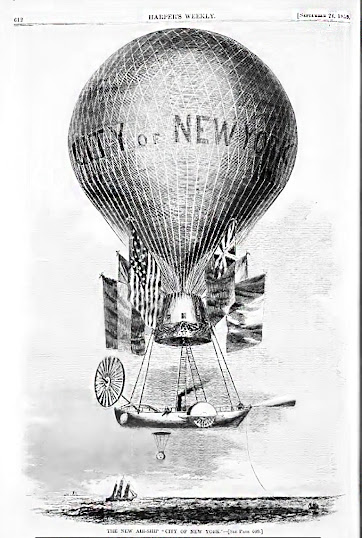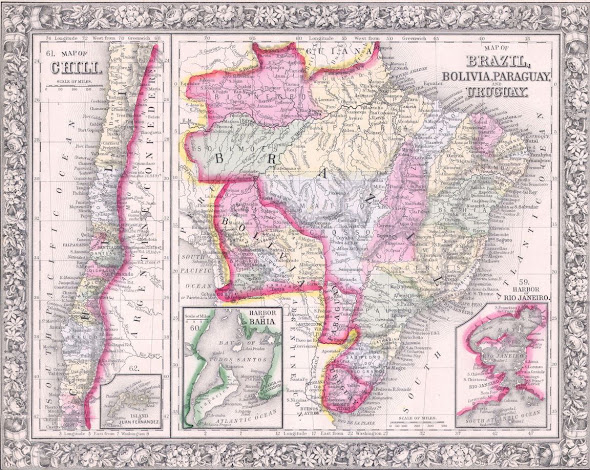The French in Mexico
The French in Mexico
Maximilian Archduke of Austria Princess Charlotte of Belgium
and Emperor of Mexico Carlota, Empress of Mexico
Napoleon
III was now on his uncle’s throne and needed a bit of glory to follow up on his
helping the Italians and Garibaldi win Italian independence and unity. Louis
XVII had lost Canada; Uncle Nappy had sold Louisiana; and, Haiti had rebelled
and become independent. France was left with a few islands off the coast of
Canada and some small Caribbean colonies.
But now there might be a way to gain a big chunk of the New World for
the glory of France.
Napoleon III calculated it looked like Mexico was up for grabs. He
intended to turn Mexico into a French puppet state.
The United States was happy to remind any European powers of the Monroe
Doctrine, but Napoleon III didn’t think the US could enforce it. They were entangled by the American Civil
War.
Both the British and the Spanish soon realized Napoleon III’s intention
went beyond collecting back debts. They backed out of the Treaty of London.
Mexico had declared independence from
the Spanish Empire in September of 1821. Almost at once, Mexico set itself up
as an empire and the southernmost provinces didn’t want to be part of
that—which is why there are a collection of small republics in Central America.
The Mexican Emperor soon fled, and a
republic formed which was soon taken over by a series of dictators, chiefly
Santa Anna. Santa Anna was finally
driven out of Mexico into exile in New York City in August 1855 by both
Conservative and Liberal factions wanting a constitutional government. With Santa Anna gone, the two groups fell to
fighting each other over.
The root of Mexico’s chaos was the
fact European descended rich Mexicans owned the majority of land while the
population at large of mulattos and native Americans starved on small ejitos,
farms growing mainly corn.
A full blooded Native American, Benito Juarez, a Liberal reformer, became president. Mexico’s aristocracy reacted as Southern aristocracy would to Lincoln—they rebelled.
Allied with the French, Conservatives soon had Juarez and his Liberal reformers on the run.
Unsmiling, grim, and determined, Juarez kept up his struggle to regain the office he had won. On the run and defeated time and again, the Liberals finally won a battle against the invaders. At Puebla, on the fifth of May 1862, the Liberals fought off a much larger French Army.
The victory is the source of the widely celebrated Cinco de Mayo. The French re
took Puebla the following year and the road to Mexico City was clear.
Battle of Puebla May 5, 1862
The Conservatives were in favor of a
monarchy, a strong monarchy that would enforce their rights to keep their large
estates and protect all the Catholic Church’s property and privileges. Mexico’s
first emperor had been self proclaimed.
The Conservatives wanted a real royal this time, somebody with an
undisputed long royal lineage.
Napoleon III popped up and said,
“I’ve got just the fellow.”
The conservatives ask, “Who?”
“How about a Habsburg Archduke,
younger brother to the Austro Hungarian Emperor Franz Josef? Franz Josef did a
good job of suppressing all those liberals who rebelled in his empire back in
1848. After all, the Habsburgs had once been emperors of both Spain and Austria
under Charles V. It would give you a sense of legitimacy.”
“OOOOOh’” said the Conservatives.
“That sounds great!”
“I’ll bring him ‘round,” Napoleon III
said.
The Archduke Maximilian looked
nothing like his brother. Tall, broad shouldered and blond, he was married to
Princess Charlotte of Belgium, thought to be one of the most beautiful women in
the world. She was crazy in love with
Maximilian. Eight years her senior, Maximilian commented on his 18 year old
bride before their wedding, “She’s quite intelligent which I find irritating,
but I suppose I’ll adjust to it.” Maximilian administered the Italian provinces
of the empire and was popular because of his liberal policies and ideals. His
older brother found Maximilian’s ideas too liberal and dismissed him. For several years, he and Charlotte did not
have a lot to do except redecorate their two castles.
So, when the delegation from Mexico
came calling to offer him the crown of Mexico, Charlotte was thrilled. Finally, her husband would be able to rule in
his own right and put his liberal policies into practice!
It took some persuasion—the Archduke
didn’t want to a place where he was not wanted, but the delegation from Mexico
assured him the country would be ecstatic to have him and his wife reign as
Emperor and Empress. Charlotte finally
persuaded Maximilian and it was off to Mexico.
Napoleon III announced the French
Army would stay to train the native Conservative army. Franz Josef sent some Austrian troops as well
to safeguard his brother and Charlotte’s father, King Leopold I, sent 4,000
Belgians as well. Max and Charlotte set
about learning Spanish and Charlotte immediately changed her name to Carlota.
While ousted President Benito Juarez sulked in the northwest deserts, the new
royal couple were deliriously hailed as they made their way to Mexico City from
Vera Cruz in October 1864.
The Conservatives were in for a
shock. It became clear Napoleon III
expected to have a lot of say in what went on and how Mexico was ruled in
return for his army and finder’s fee. Worse, from both Napoleon III’s and the
Conservatives’ points of view, Maximilian looked at Benito Juarez’ proposed
reforms and said, “Great! That’s just what I thought, too. I’ll ask him back to
be prime minister and we’ll set up a constitutional monarchy.”
To everyone but Maximilian’s relief,
Juarez said, “No way! I was elected president and you’re a foreign king, now
get out!”
The Liberals kept fighting.
Frustrated with the continued
resistance, Maximilian accepted the very bad advice of the French commander and
declared anybody captured and believed to be a rebel would be immediately shot.
Benito Juarez 1862
Despite good intentions, the new
emperor and empress were not much help to the Conservative Armies’ cause. As the Conservatives’ army crumbled, Napoleon
III sent more of his French army to Mexico, propping up his chances to create a
puppet government in Mexico.
Dec 25, 1863 Memphis Daily Appeal
New Orleans advices via Memphis, per the schooner Henry Ward, arrived
from Vera Cruz, confirm the reported capture of Puebla by the Mexicans.
The roads in Mexico are generally in
possession of the guerillas, and the French supplies can only be carried
through by heavy escorts.
Lincoln and Secretary of State Seward
were not happy about the open violation of the Monroe Doctrine and more than a
little irritated at the French willingness to build warships for the
Confederates.
By 1865, Benito Juarez was winning.
The American Civil War over, it was time to remind the French of the Monroe
Doctrine. General Phil Sheridan, one of
the Union’s best cavalry generals, showed up on the Rio Grande with 50,000
battle seasoned troops and somehow tens of thousands of rifles and ammo boxes
were lost by the Union Army on the banks of the Rio Grande. (“Where they could
be conveniently found,” Sheridan wrote later.)
The French had no desire for war with United States. With the new,
enlarged US Navy sure to blockade Mexico it would be nearly impossible to
resupply their army from such a distance.
Jan 20, 1866 Dallas Herald
WASHINGTON—Official news from the city of Chihuahau December
2 says President Juarez has entered on a new term without opposition. Alvarez
appointed General in Chief to replace Oriega who was assassinated on
Maximilian’s orders.
The French Army left.
Soon afterwards, Carlotta, returned
to Europe, going from one European capital to another to raise support for
Maximilian. No country would come to their aid. Frantic and already mentally
unstable, Carlota became delusional, fearing hidden enemies were trying to
poison her.
Maximilian stayed, determined not to
run away and trusting he could finally reach an agreement with Juarez now that
most of the extreme Conservatives had been put to flight.
Juarez’ victorious armies entered
Mexico City in 1865. Maximilian and remnants of the Conservative Army retreated
eastwards and were eventually surrounded by Juarez’ forces. Maximilian and his top two generals were captured.
One of the great international scandals followed. Juarez announced his
intention to execute the would be emperor. The international community was
horrified. Universally, heads of state,
prestigious writers and artists, wealthy businessmen all wrote the new Mexican
government or published letters of support for Maximilian to be returned to
Austria.
All to no avail. Maximilian was sentenced to be executed by
firing squad in June 1867 along with his two generals. He gave each of his executioners a gold piece
asking them to aim at his body, not his head so his mother would not see bullet
wounds. Juarez had made his government in Mexico an international pariah at one
stroke. By the time Maximilian was executed, doctors had already decided
Carlota was too ill to be informed she was now a widow. She lived the rest of
her life locked away in a small castle in Belgium and died in 1926.
June 22, 1867 Texas Republican
Intelligence of Mexico by way of
Galveston, under the date the 10th (June) announces the execution of
Manchos and Campos, and also informs us Escobedo had ordered court martial to
try the Emperor. Maximilian had called on the Prussian Minister at Mexico to
defend him. In surrendering his sword to Escobedo, Maximilian said: “I
surrender to you my sword owing to an infamous treason, without which
tomorrow’s sun would have seen yours in my hands.
The Following is His Proclamation to his countrymen:
Countrymen—After the valor and patriotism of the Republican
forces destroyed my scepter in this place, the tenacious defense of which was
indispensable the honor of myself and my race.
After this
bloody siege, in which the Imperial and Republican soldiers have competed in
abnegation and boldness, I will explain myself, countrymen, I came to Mexico
not only animated by the best faith of ensuring the felicity of all of us, but
called and protected by the Emperor of France, Napoleon III. He, to the
ridicule of France, abandoned me cowardly and infamously, by the demand of the
United States, after having uselessly spent France’s treasurer and shed the
blood of her sons and your own.
When the news
of my fall and death reaches Europe, all the monarchs of Charlemagne’s country
will demand an account of my blood—of the German, Belgian, and French blood
shed in Mexico. Then will be the end.
Soon, before
the world, Napoleon III covered with shame from head to foot. Today, he has
already seen His Majesty, the Emperor of Austria, praying for my life to the
United States, and myself a prisoner of war in the hand of the Republican
Government and with my crown torn in pieces.
Countrymen,
here are my last words: I desire that my blood may regenerate Mexico, and that
my fate will serve as a warning to all ambitious and insidious men, and that
you will in prudence and truthfulness, and noble virtues the flag sustain. May
Providence save you and make you worthy of myself. MAXIMILIAN
Shasta Ca. Courier Aug 24, 1867
THE EMPRESS CARLOTA—The Memorial Diplomatique says:
We have received afflicting news from Miramar. Empress Carlota, separated about a year ago from her husband, deprived for more than three months of all direct intelligence, and after having become prey since the departure of the French troops to the keenest emotions and most poignant anxieties, has fallen into a moral prostration of the most alarming character. Her Majesty no longer seems to have any consciousness of what is passing around her, and remains plunged in a gloomy reverie, from which D. Ilek has not for a moment been able to rouse her—not even when he announced the cruel event which wounds her dearest affections. The complete indifference with which the unfortunate Princess received that formidable blow but too well justifies the fear that science will now be powerless to save that fine intellect. As Dr. Ilek had from the first made himself responsible for the cure of the Empress, Maximilian I, who had placed confidence in him, left him absolute master of the treatment to be followed. For that reason neither the Austrian family nor the Court of Brussels ventured to interfere in a matter so delicate. At the present time the Emperor of Mexico having fallen under the murderous bullets of the Juaerezist, the rights of the two families will naturally be substituted for the authority of her husband. With that Object the Queen of the Belgians has left Brussels to be present at the family council assembled at Salzburg, and thence her majesty will proceed to Miramar. The medical men are of the opinion Aa final experiment ought to be made by transporting the Princess Carlota into the midst of her youthful reminisces in the Palace Laeken. This step will, in fact, be adopted as soon as an assurance can be entertained that this long journey can be accomplished without aggravating the state of the august invalid.
Soon after his death in 1872, most of Benito Juarez’ liberal work was undone. In 1873, Porfirio Diaz, one of Juarez’ Liberal comrades in the War of the Reforma took over Mexico and ruled as dictator until 1910 when the next Mexican revolution broke out.









Comments
Post a Comment